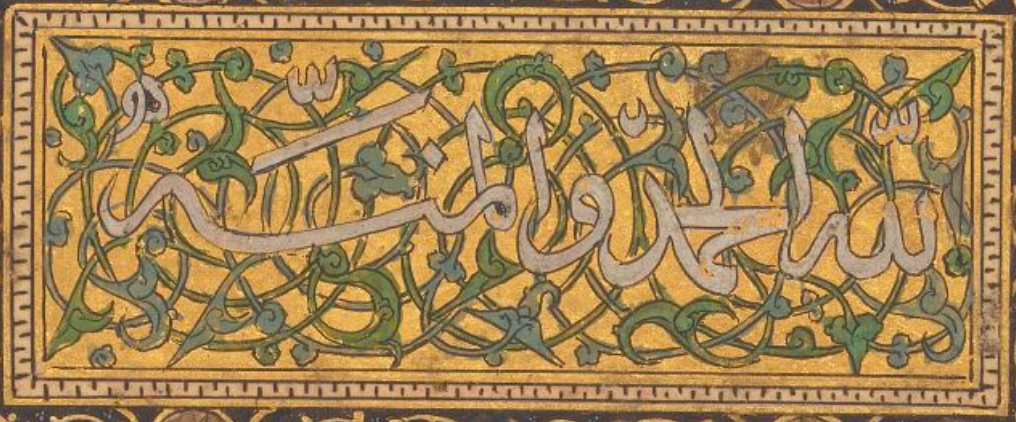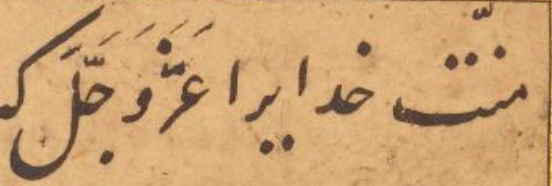Introduction page, top title
Link to Chester Beatty Digital Collections
لِلهِ الحَمْدُ وَ المِنَّةُ
All Praise and All Gratitude for Allah
لِلهِ
لِ+الله
Li-Allah-i: Li (for, belongs to) Allah (God)
Allah
Al-ilāhu means deity identified by the identifier Allah, and all other than Allah whom taken as worshiped deity called ilāh in reference to its worshiper . The plural of Al-ilāh is Al-Ālihat meaning idols and such naming is in place due to the people’s belief that worshiping an idol can deify the object into a consequent-god and the naming of the idols are the direct consequence of such worship and not anything of the idol’s essence in and of itself.
الإلَهُ: الله عز وجل، وكل ما اتخذ من دونه معبوداً إلَهٌ عند متخذه، والجمع آلِهَةٌ. والآلِهَةُ: الأَصنام، سموا بذلك لاعتقادهم أَن العبادة تَحُقُّ لها، وأَسماؤُهم تَتْبَعُ اعتقاداتهم لا ما عليه الشيء في نفسه
The origins of the word Al-ilāhu is from Aliha/Ya’lahu meaning bewilderment when the servant is perplexed by the Divine Attributes and his mental faculties fail him to understand, loathes people’s presence until such limit where he desires nothing and no one within his heart—loves no one but Allah the Singleton deity worthy of love/worship.
لسان العرب
وأَصله من أَلِهَ يَأْلَهُ إذا تَحَيَّر، يريد إذا وقع العبد في عظمة الله وجلاله وغير ذلك من صفات الربوبية وصَرَفَ وَهْمَه إليها، أَبْغَضَ الناس حتى لا يميل قلبه إلى أَحد
لسان العرب
وليس هو من الأَسماء التي يجوز منها اشْتقاق فِعْلٍ كما يجوز في الرحمن والرحيم
Some others said the origin of the Al-ilāh is Wilāh meaning the creation seek IT/Him for all their needs, and they complain to IT/Him for all that hurts them, as every child goes to the mother for all needs for all complaints.
لسان العرب
وأَصل إلَهٍ وِلاهٌ، فقلبت الواو همزة كما قالوا للوِشاح إشاحٌ وللوِجاحِ وهو السِّتْر إِجاحٌ، ومعنى ولاهٍ أَن الخَلْقَ يَوْلَهُون إليه في حوائجهم، ويَضْرَعُون إليه فيما يصيبهم، ويَفْزَعون إليه في كل ما ينوبهم، كم يَوْلَهُ كل طِفْل إلى أُمه
مِنَّة
مِنَّت Farsi spelling
Minnat in Farsi or Minna in Arabic: Bestowal of kindness or favors or gifts in two manners:
- Bestowing free of obligating the beneficiary to offer gratitude and praise
- Bestowing with pomp and expecting the beneficiary to offer much gratitude or praise in return
المَنّانُ one of the Divine Names of Allah namely The Benefactor who bestows free of any boasting!
لسان العرب
وفي أَسماء الله تعالى : الحَنّانُ المَنّانُ أَي الذي يُنْعِمُ غيرَ فاخِرٍ بالإِنعام
In the case of usage in the Gulistan this particular usage of Minnat here renders gratitude offered by the servants to Allah for all the generosity.
مِنَّتِ خُدايْرا عَزَّ وَ جَلَّ
مِنَّتِ خُدايْ+را عَزَّ وَ جَلَّ
مِنَّتِ خُدايْ+را
Minnat-eh Khoday: خُدايْ or خُدا (God) Minnat renders the act of gratitude and appreciation and praise for The Divine Benefactor. Therefore it reads: Gratitude and Praise for the God
را
Rā: A two-letter sign/word which indicates what is before it as object of the sentence.
Zaid hit Bakr Rā: Rā here indicates what is before it namely Bakr is the object that indeed Zaid hit him.
This type of object is called Maf’oul-e Sarih or Direct Object.
در زبان فارسی آن را «علامت مفعول صریح » دانسته اند. در نهج الادب چنین آمده است :«برای معانی گوناگون آید اول «را»ی علامت مفعول که برای اظهار مفعولیت ماقبل خود آید; چنانکه در این قول : «زید بکر را زد.»
عَزَّ
‘Azz-a: A Divine Name namely Mighty Subjugator whom no one could subjugate.
جَلَّ
Jall-a: Infinitely powerful, another template Jalāl الجلال one of the Divine Names of Allah. Since there are no bounds to limit Allah and there are no minds or intellects to have full comprehension of IT, Allah created large and most powerful innovations and creatures as pointers to point at its Jalāl الجلال or Might and Power.
که
K-eh: as if , that, who, where, whether, whom, which
{موصول ، حرف ربط، ادات استفهام}
«که » از نظر لغوی به معانی کس ، کسی که ، ومرادف «الذی » و «التی » عربی و جز اینهاست و برحسب موارد استعمال گوناگون آن در دستور زبان فارسی گاه موصول و گاه حرف ربط است و گاه دلالت بر استفهام دارد:
1 – «که » موصول قسمتی از جمله را به قسمت دیگر می پیوندد و برای عاقل به کار می رود، مانند: «مردی که آمد». و غالباً پیش از آن «هر»، «ی نکره »، «این »، «آن » و «ضمایر منفصل من ، تو…» می آید. (از دستور زبان فارسی تالیف پروین گنابادی ، دیوشلی ، سال سوم ص 189) (از یادداشتهای مرحوم دهخدا)
Acknowledgements
With thanks to Dr. Moya Carey, Curator of Islamic Collections, Chester Beatty, Dublin
© 2019-2002, Dara O Shayda
License
https://creativecommons.org/licenses/by/4.0/


